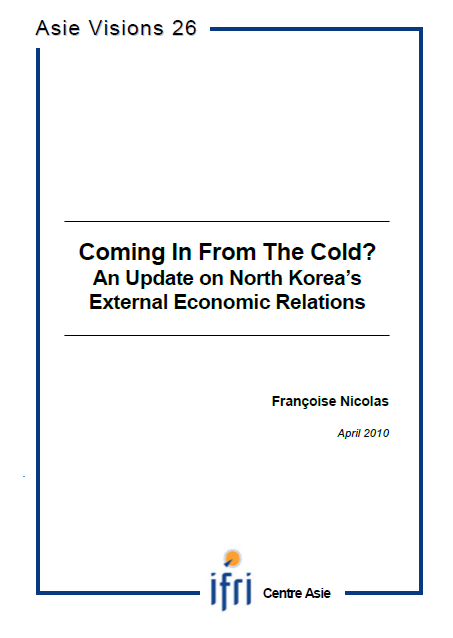Coming in from the Cold? An Update on North Korea's External Economic Relations

This brief analysis of the current external economic relations of the Democratic People’s Republic of Korea (DPRK) leads to a number of conclusions.
First, the North Korean economy maintains very limited exposure to the outside world and, as a result, to external influence. In terms of volume North Korea's trade is minuscule, even in relation with the size of its economy. This is also the case for foreign direct investment inflows.
Secondly, although North Korea is less isolated than often thought, its trade and investment flows are very heavily polarized both geographically and sectorally, limiting de facto their potential impact. In contrast to what was the case during the Soviet era, North Korea's main economic partners are not ideological partners but neighboring economies, namely China and South Korea. They are major partners in trade as well as in FDI. Russia still plays a non-negligible role but is in no way comparable to what was the case before the demise of the Soviet bloc.
Thirdly, North Korea's external economic relations are very much dictated by political considerations. Politics accounts both for the choice of partners and for the nature of the economic relations.
Fourthly, and more importantly, the very distinct nature of the DPRK's connection with the rest of the world, and primarily with its two major economic partners, sets it apart from other transition economies and in particular from China, but also from Vietnam. In the case of North Korea, economic openness, although announced time and again as an official objective, cannot be seen as an instrument for enhancing competitiveness or as part of a development strategy. The recent, renewed signs of reform in the direction of increased openness should thus be interpreted with utmost caution.
Fifthly, the structure of the country's external trade is indicative of an economy in survival mode. The substantial aid component in the inter-Korean trade and FDI relationship undoubtedly further substantiates such a claim. Surprisingly, relations between North Korea and China are more often based on a market-economy logic, although this only holds true for trade flows and not FDI flows. The probability of change through trade appears still very limited.
Lastly, the role the European Union may play in the region remains very much an open question but the margin of maneuver is limited. Given the state of play described earlier, it would be extremely naïve to believe that a European engagement strategy vis-à-vis the DPRK could contribute to economic change. In addition, the country's lack of attractiveness for potential investors is a further obstacle. However, the persistent uncertainty and the lack of visibility over the political and economic evolution of the DPRK should not deter European interest in the region and, far to the contrary, should provide a strong incentive to closely monitor the economic moves made in Pyongyang.

Available in:
Regions and themes
ISBN / ISSN
Share
Download the full analysis
This page contains only a summary of our work. If you would like to have access to all the information from our research on the subject, you can download the full version in PDF format.
Coming in from the Cold? An Update on North Korea's External Economic Relations
Related centers and programs
Discover our other research centers and programsFind out more
Discover all our analyses
Opening up the G7 to South Korea to Address Contemporary Global Challenges
The G7’s global influence has diminished as powers like China reshape international governance through initiatives such as BRICS and the Shanghai Cooperation Organisation (SCO). With the G7 now representing just 10 per cent of the world’s population and 28 per cent of global GDP, its relevance is increasingly questioned.
Expanding SPDMM as a pivotal institution in the Pacific – A French perspective
The South Pacific Defence Ministers’ Meeting (SPDMM) is the only forum that brings together defense ministers from the wider South Pacific — including Chile, which is hosting it for the first time. This heterogeneous group of countries with varying resources, capacities, and interests — Australia, Chile, Fiji, France, New Zealand, Papua New Guinea (PNG), and Tonga — are united by their shared determination to strengthen cooperation on maritime security and humanitarian assistance and disaster relief (HADR) activities.
EU’s Derisking From China: A Daunting Task
With economic security as a major concern, the EU has recently turned to “derisking” from China. The EU strategy entails reducing critical dependencies and vulnerabilities, including in EU supply chains, and diversifying where necessary, while recognizing the importance and need to maintain open channels of communication.
Sri Lanka’s NPP Government. From System Change to Structural Compliance
In September 2024, a relative outsider to Sri Lanka’s two-party-dominated political system, Anura Kumara Dissanayake, won the presidential elections. The anti-establishment, populist movement he represented, the National People’s Power (NPP), went on to receive an overwhelming mandate in the November 2024 general elections, winning 159 seats in a 225-member parliament.










